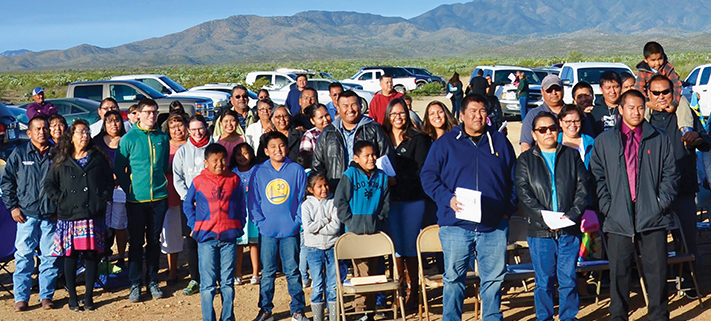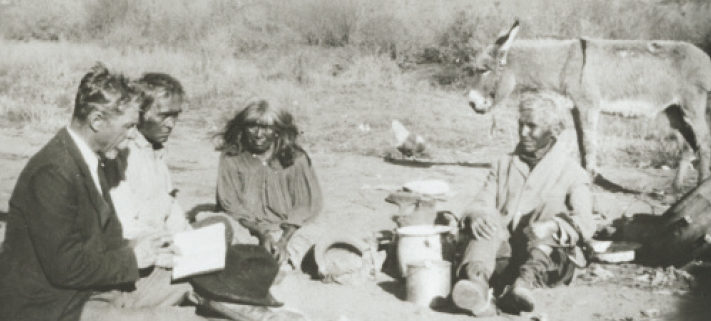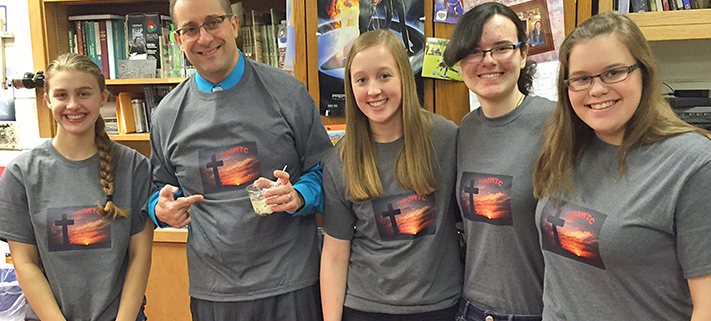What do I need to consider before I give my child a cell phone?
My oldest is 12. She’s in sixth grade, and almost all her classmates have smartphones. So far her dad and I haven’t seen a reason for her to have one too. But the pressure is there. Socially, she finds herself at a disadvantage. Her peers are texting one another, playing on the latest apps, taking selfies, and . . . well, I’m not even sure of what else because I’m just not that tech-savvy. Hearing from parents who have been through this stage is helpful as my husband and I try to navigate what is best for our family.
Here are two perspectives from parents who are raising teens now. This is a broad topic, so we know there are many other perspectives to consider. Share your family’s insights at forwardinchrist.net.
Nicole Balza
Disclosure alert . . . my husband and I are definitely not the poster parents when it comes to cell phones and kids. In fact, I originally declined writing this article because we have made so many mistakes along the way—it’s embarrassing! But if someone had laid it all out when we were having the whole “I need a phone” conversation with our first child, who is now 18, I’m pretty sure we would have done things differently.
It’s true. The pressure is huge for kids to get a phone. All of their friends have them, and as a parent, you see it as a way to keep them safe. But be cautious—once you enter this realm, there is no going back. Be over-prepared in this journey and plan it out. Here are just a few things we have learned along the way with our kids and their phones.
Start with the basics
Back when we were kids, no one had cell phones. Today, if we forget our phone at home, it’s like we have lost a limb. That feeling of safety and convenience when your child has a phone is undeniable. But do they really need a smartphone? A basic cell phone really can be sufficient, especially when they are in grade school.
I’ll be honest—we fell into the trap of “everyone has a smartphone at this age,” thinking it must be the right thing to do. I wish we could go back and start our children off with a basic cell phone. Sometimes I think parents are just as worried about fitting in as their kids are. Try not to let the crowd decide what is best for you and your family.
Set limits
Phones truly do become a huge part of our kids’ lives, so you need to know and own this fact: YOU are the one that needs to be the enforcer of limits. Before you purchase a phone, sit down and think through exactly how much phone/screen time your child should have, and then make that happen. Be intentional. Tons of apps are available that limit screen time. OurPact (ourpact.com) is one that a friend recommended to us. It can block Internet and app usage on your child’s phone and set a schedule for activities like school, dinnertime, or bedtime. Also, take the phone out of their room at night—even if they tell you they need it for their morning alarm (yes, we hear that one all the time).
Personally set limits on your phone/screen time. Consistently take time to do meaningful things with your kids that don’t involve technology. It’s amazing how different we are as a family when phones are put away and we are playing games without that constant distraction.
Social media
Snapchat, group rooms, Instagram . . . these are lifelines for our kids. It’s the way they stay connected with each other, but it can also be a place where they can get seriously torn down. It is crazy what kids will write on social media sites that they would never think about saying in person. Remind your kids that what they write on those sites is there for all to read . . . potentially forever. And if you don’t think they are ready to be on these sites, stand your ground—even when their friends claim they have to be on a particular site for their “group project.” They’ll find a different way to connect.
Okay, so yes, you probably will end up getting your child a smartphone. It’s the world we live in. But my biggest piece of advice for you is to have a plan, and, of course, pray that God will guide you in this huge growing-up process for your child. This little piece of technology has the potential to change your child’s life in a big way—so make sure you do everything you can to make it positive.
Ann Zuleger and her husband, Matt, have four children—Zachary, 18; Faith, 16; Isaiah, 13; and Ellis, 10.
Parenting sure has changed! I remember a two-week trip abroad as a high school junior. My parents heard via one very quick and expensive phone call that I’d reached Germany, but the only other communication was a postcard arriving after I’d returned to Wisconsin. Now I worry if my high school junior doesn’t text me that she made it to her babysitting job 10 miles away.
On the plus side, cell phones provide a quick and easy way to check up on our kids, make plans or adjustments to plans, send a picture of the puppy to the one away at college, or ask for someone to please pick up more milk. Bible verses on a stressful day or an “I love you!” randomly sent are wonderful ways to use this technology.
Our family policies
Although every family is unique, eighth-grade graduation is the time when our children receive their first cell phone. Once in a while there’s a free bonus month, but the kids pay the monthly service fees themselves. And, besides reminders about Christian conduct, general encouragements like “No phones at the table,” and an expectation that a timely response is necessary if Mom or Dad texts or calls, we don’t really monitor their phone use. This seems to have worked, but I wondered what the three kids, ages 22, 20, and 17, who currently have phones, and the 13-year-old, who doesn’t yet, thought of our family policies?
On waiting until eighth-grade graduation for their first phone, our kids all agreed it was fine. “For our situation, it was just right because that way we wouldn’t get caught up in social media until we were a little more responsible and we would entertain ourselves in other ways. In some cases it might be better to get it earlier if that particular family member needs to be able to communicate for rides and stuff when they are younger.”
On our relaxed phone rules, all four said there aren’t any other policies we should have that we don’t: “It is good for us because we have built a trust bond so you can rely on us to be smart with them. Some kids do need a feeling of being watched over their shoulder or else they will do really dumb stuff.” And, “As a parent, you should be able to trust that you raised your kids to be responsible enough to make good decisions.”
As for paying their service fees: “Nothing in life is free, so it’s good to learn basic responsibilities like paying for a phone.” Another commented, “It makes you think that it is a privilege that you’ve earned not just something given to you,” but “younger kids should not have to pay for it because their parents are the ones giving it to them as a necessity.” (I would also like to add that no one has lost their phone for longer than a few minutes, which seems to be somewhat of a rarity these days and perhaps due to the fact that these kids are paying their own way.)
Some positives and negatives
I also asked, “Did a cell phone change you or your life?” One said, “It did not change me, but it changed my life. It made it easier to contact friends for homework help or just to socialize.” Another mentioned, “[A cell phone] definitely came with negative and positive changes. A lot of the time I overuse my phone when I could be doing something else or talking person to person instead. You’re oftentimes so worried about what everyone else is doing that you don’t take advantage of what you have in front of you. Social media tends to warp your mind and make you ungrateful, but on the other hand, it can also be simple entertainment.” One also commented on useful apps like GPS and managing his bank account, but says, “It can take too much of your time or [lead to] spending money because of wanting the newer or better thing.” One other note from the child who admits to being rather “anti-phone”: “I don’t have an excuse for not knowing certain things or being ‘off the grid.’ ”
So, friends, there you have it! Not necessarily the definitive guide to parenting in the cell phone age, but, at least, what has worked for us. May God bless our families as we use the tools at our disposal to raise our blessings in the nurture and admonition of the Lord.
Ann Ponath and her husband, David, have four kids ranging in age from 22 to 13. Their oldest son, David, shared his thoughts about cell phones in an article that is available at forwardinchrist.net.
Do you have a manuscript, idea, or story from your own life you’d like to share for use in Forward in Christ or on wels.net? Use our online form to share it to our editorial office for consideration.
Get inspirational stories, spiritual help, and synod news from Forward in Christ every month. Print and digital subscriptions are available from Northwestern Publishing House.
Author: Multiple Authors
Volume 105, Number 04
Issue: April 2018
Copyrighted by WELS Forward in Christ © 2021
Forward in Christ grants permission for any original article (not a reprint) to be printed for use in a WELS church, school, or organization, provided that it is distributed free and indicate Forward in Christ as the source. Images may not be reproduced except in the context of its article. Contact us








